中级美语教程1
- 格式:docx
- 大小:39.43 KB
- 文档页数:6
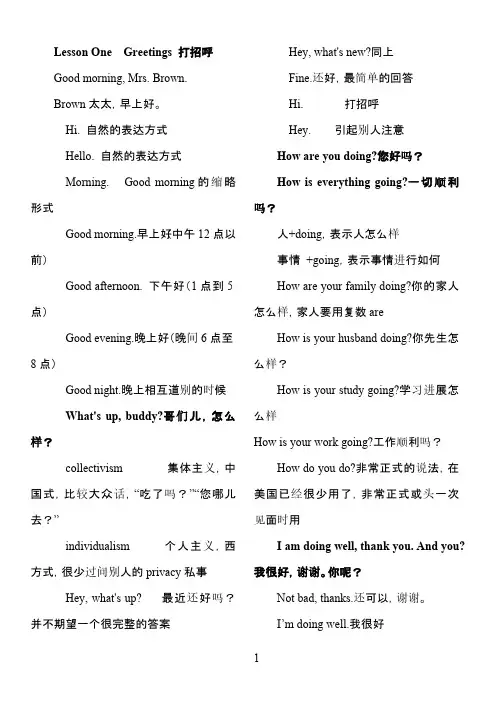
Lesson One Greetings 打招呼Good morning, Mrs. Brown.Brown太太,早上好。
Hi. 自然的表达方式Hello. 自然的表达方式Morning. Good morning的缩略形式Good morning.早上好(中午12点以前)Good afternoon. 下午好(1点到5点)Good evening.晚上好(晚间6点至8点)Good night.晚上相互道别的时候What's up, buddy?哥们儿,怎么样?collectivism 集体主义,中国式,比较大众话,“吃了吗?”“您哪儿去?”individualism 个人主义,西方式,很少过问别人的privacy私事Hey, what's up? 最近还好吗?并不期望一个很完整的答案Hey, what's new?同上Fine.还好,最简单的回答Hi. 打招呼Hey. 引起别人注意How are you doing?您好吗?How is everything going?一切顺利吗?人+doing,表示人怎么样事情+going,表示事情进行如何How are your family doing?你的家人怎么样,家人要用复数areHow is your husband doing?你先生怎么样?How is your study going?学习进展怎么样How is your work going?工作顺利吗?How do you do?非常正式的说法,在美国已经很少用了,非常正式或头一次见面时用I am doing well, thank you. And you?我很好,谢谢。
你呢?Not bad, thanks.还可以,谢谢。
I’m doing well.我很好I’m well.I’m fine. 听不错的Well, can’t be better.好的不能再好了Well, it’s OK. 还可以吧Well, not bad.同上Oh, just soso.一般般了Oh, not good.不好Really bad.很糟糕How is your husband?你先生好吗?Allen was sick last week, but now he feels better.Allen上周病了,但现在他好多了。
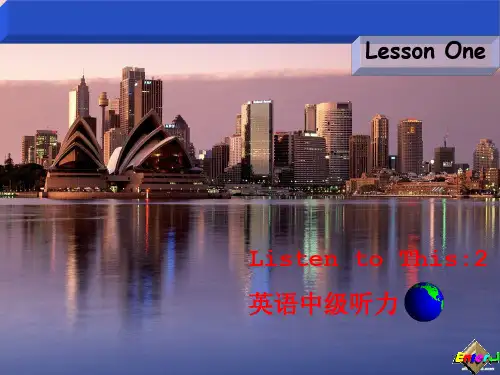
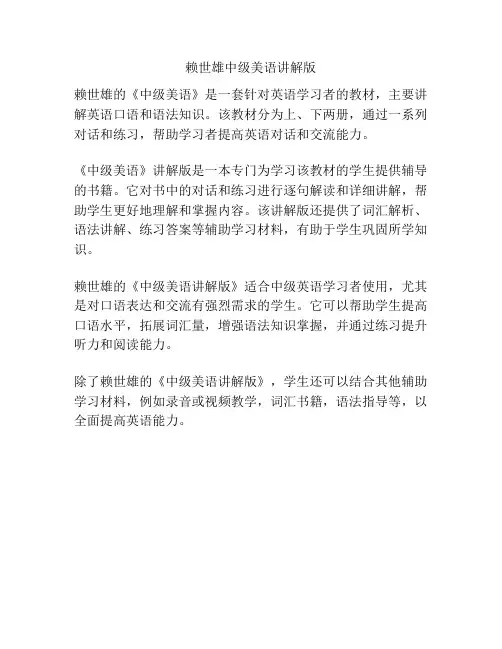
赖世雄中级美语讲解版
赖世雄的《中级美语》是一套针对英语学习者的教材,主要讲解英语口语和语法知识。
该教材分为上、下两册,通过一系列对话和练习,帮助学习者提高英语对话和交流能力。
《中级美语》讲解版是一本专门为学习该教材的学生提供辅导的书籍。
它对书中的对话和练习进行逐句解读和详细讲解,帮助学生更好地理解和掌握内容。
该讲解版还提供了词汇解析、语法讲解、练习答案等辅助学习材料,有助于学生巩固所学知识。
赖世雄的《中级美语讲解版》适合中级英语学习者使用,尤其是对口语表达和交流有强烈需求的学生。
它可以帮助学生提高口语水平,拓展词汇量,增强语法知识掌握,并通过练习提升听力和阅读能力。
除了赖世雄的《中级美语讲解版》,学生还可以结合其他辅助学习材料,例如录音或视频教学,词汇书籍,语法指导等,以全面提高英语能力。
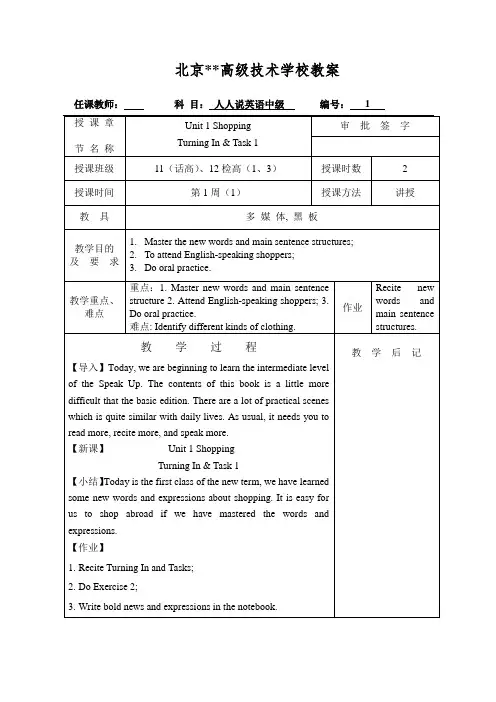
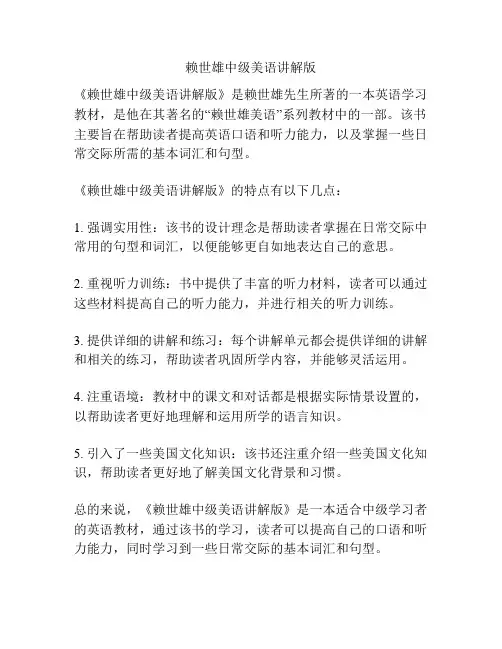
赖世雄中级美语讲解版
《赖世雄中级美语讲解版》是赖世雄先生所著的一本英语学习教材,是他在其著名的“赖世雄美语”系列教材中的一部。
该书主要旨在帮助读者提高英语口语和听力能力,以及掌握一些日常交际所需的基本词汇和句型。
《赖世雄中级美语讲解版》的特点有以下几点:
1. 强调实用性:该书的设计理念是帮助读者掌握在日常交际中常用的句型和词汇,以便能够更自如地表达自己的意思。
2. 重视听力训练:书中提供了丰富的听力材料,读者可以通过这些材料提高自己的听力能力,并进行相关的听力训练。
3. 提供详细的讲解和练习:每个讲解单元都会提供详细的讲解和相关的练习,帮助读者巩固所学内容,并能够灵活运用。
4. 注重语境:教材中的课文和对话都是根据实际情景设置的,以帮助读者更好地理解和运用所学的语言知识。
5. 引入了一些美国文化知识:该书还注重介绍一些美国文化知识,帮助读者更好地了解美国文化背景和习惯。
总的来说,《赖世雄中级美语讲解版》是一本适合中级学习者的英语教材,通过该书的学习,读者可以提高自己的口语和听力能力,同时学习到一些日常交际的基本词汇和句型。
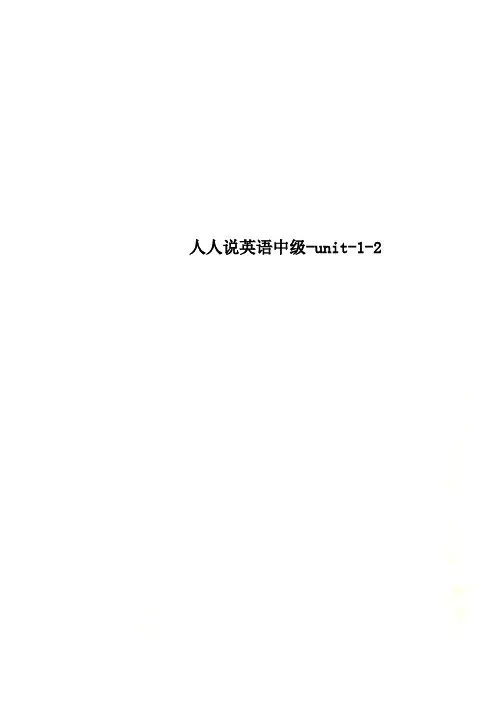
人人说英语中级-unit-1-2北京**高级技术学校教案任课教师:科目:人人说英语中级编号: 2教案纸教学内容、组织、教法、要求说明教学内容、组织、教法、要求说明【复习】Do a dictation about the new words and expressions. Then, ask several students to recite or retell the passage in Turning In and the conversation in Task 1. At last, check on the Exercise 2: ask pairs of students to present their dialogue in class.【导入】Last class, we came across an English-speaking shoppers who is a cute handsome guy in the shop. Today, we are going to follow him and see what will happen then.【新课】Unit 1 ShoppingTask 2, Task 3 & Task 4Step 1 Task 2.1.Listen to the dialogue and then read after the recording. Ask students to close their books and play the recording twice. Then, ask the following questions:What does the customer want to buy?What’s his size?How much is the jacket?After that, ask students to open the book and read the dialogue of Task 2. Then, go over the dialogue with students together and pay more attention to the bold part of the dialogue.1)I’m looking for a light blue sport jacket.我想买一件浅蓝色运动衫。
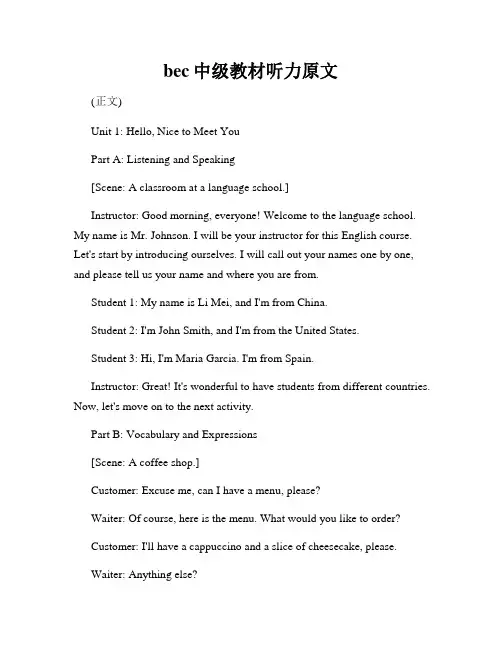
bec中级教材听力原文(正文)Unit 1: Hello, Nice to Meet YouPart A: Listening and Speaking[Scene: A classroom at a language school.]Instructor: Good morning, everyone! Welcome to the language school. My name is Mr. Johnson. I will be your instructor for this English course. Let's start by introducing ourselves. I will call out your names one by one, and please tell us your name and where you are from.Student 1: My name is Li Mei, and I'm from China.Student 2: I'm John Smith, and I'm from the United States.Student 3: Hi, I'm Maria Garcia. I'm from Spain.Instructor: Great! It's wonderful to have students from different countries. Now, let's move on to the next activity.Part B: Vocabulary and Expressions[Scene: A coffee shop.]Customer: Excuse me, can I have a menu, please?Waiter: Of course, here is the menu. What would you like to order?Customer: I'll have a cappuccino and a slice of cheesecake, please.Waiter: Anything else?Customer: No, that's all. Thank you.Part C: Listening Comprehension[Scene: A hotel front desk.]Receptionist: Welcome to the Ivory Hotel. How may I assist you?Guest: Hi, I have a reservation. My name is Peter Johnson.Receptionist: Let me check. Yes, Mr. Johnson, we have a room reserved for you. Here is your key. Enjoy your stay!Guest: Thank you. Can you also recommend some local attractions or restaurants?Receptionist: Sure! There's a famous museum just a few blocks away, and a great seafood restaurant on the waterfront. I can give you a map with all the information.Part D: Speaking Practice[Scene: Two friends talking about their weekend plans.]Friend 1: Hey, what are you doing this weekend?Friend 2: I'm not sure yet. Do you have any ideas?Friend 1: How about going hiking? There's a beautiful trail in the mountains.Friend 2: That sounds fun! Let's do it.Friend 1: Great! I'll pick you up on Saturday morning.Unit 2: Daily RoutinesPart A: Listening and Speaking[Scene: A conversation between two roommates.]Roommate 1: What time do you usually wake up in the morning?Roommate 2: I usually wake up at around 7:00 am. How about you?Roommate 1: I'm an early riser. I wake up at 5:30 am every day.Roommate 2: Wow, that's early! Do you have a morning routine?Roommate 1: Yes, I like to exercise and have breakfast before starting my day.Part B: Vocabulary and Expressions[Scene: A kitchen.]Person 1: Can you please pass me the sugar?Person 2: Sure, here you go.Person 1: Thanks. I also need some salt and pepper.Person 2: Here are the salt and pepper shakers. Is there anything else you need?Part C: Listening Comprehension[Scene: A radio interview with a famous chef.]Interviewer: How did you become interested in cooking?Chef: Well, it all started when I was a child. I used to watch my grandmother cook, and I was fascinated by the process. I started experimenting with different recipes and fell in love with the art of cooking.Interviewer: What is your daily routine as a chef?Chef: My day usually starts early in the morning. I go to the market to buy fresh ingredients, then spend the rest of the day in the kitchen, preparing meals for the restaurant. It's a busy but rewarding job.Part D: Speaking Practice[Scene: Two friends discussing their evening routines.]Friend 1: What do you usually do in the evenings?Friend 2: After work, I like to relax and watch TV. Sometimes I also cook dinner.Friend 1: That sounds nice. I usually go to the gym in the evenings.Friend 2: That's a healthy routine. I should try to incorporate some exercise into my evenings too.(Note: The above text is a sample response to the requested article. The content may not be an actual transcription of a specific BEC intermediate textbook listening exercise.)。
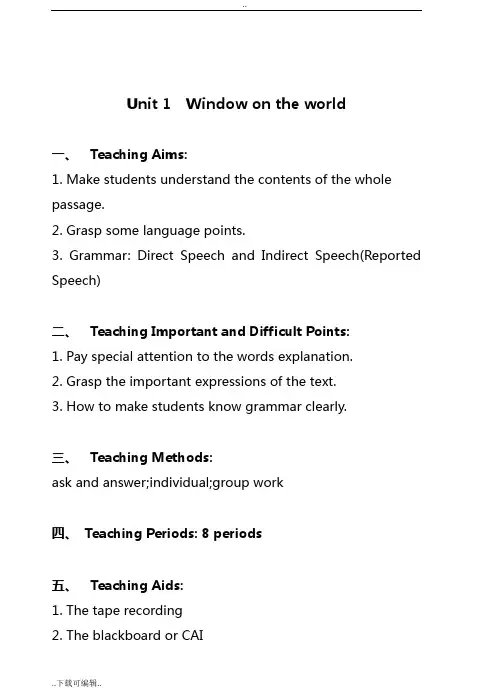
Unit 1 Window on the world一、Teaching Aims:1. Make students understand the contents of the whole passage.2. Grasp some language points.3. Grammar: Direct Speech and Indirect Speech(Reported Speech)二、Teaching Important and Difficult Points:1. Pay special attention to the words explanation.2. Grasp the important expressions of the text.3. How to make students know grammar clearly.三、Teaching Methods:ask and answer;individual;group work四、Teaching Periods: 8 periods五、Teaching Aids:1. The tape recording六、Teaching Procedures:Step 1.Lead in1.Introduce the topic of the lessons and the main functions presented.2.Ask students the questions and generate discussion.Step nguage points1. You know what?Eg: You know what?More than that,we met Michael Jackson there and had a good tome.2. Every time we go aboard,my wife always spends a fortune on shoes.spends a fortune on shoes:use a lot of money on shoes Eg: He spends a fortune on horse racing.3. I tried to make things better…make things better: make things change for the better Eg: He is angry with me,so Ibought him a present to make things better between us.4. ...there was going to be a three-hour delay due to technicalProblems.due to: because of,caused byEg: His success is entirely due to his hard work.5. I felt like taking a shower but the shower wasn’t working. feel like: have a wish for;wantEg: I don’t feel like dancing now.6. I am writing with regard to your advertisement about the package tour to Bogota,Colombia.with/in regard to: as concerns,in respect of,in connection withEg: There are some errors with regards to spelling in your writing.7.I look forward to hearing from you.look forward to sth/doing sth: expect sth with eagerness and pleasureEg: I look forward to receiving your reply as soon as possible.8.I was wondering whether your travel agency arrange for my transfer from and to the airport.arrange for: make preparations for;organize in advance Eg: We must arrange for a boat for them.Step 3.Grammar直接引语与间接引语Direct Speech and Indirect Speech(Reported Speech)1、定义直接引述别人的话,叫“直接引语”。
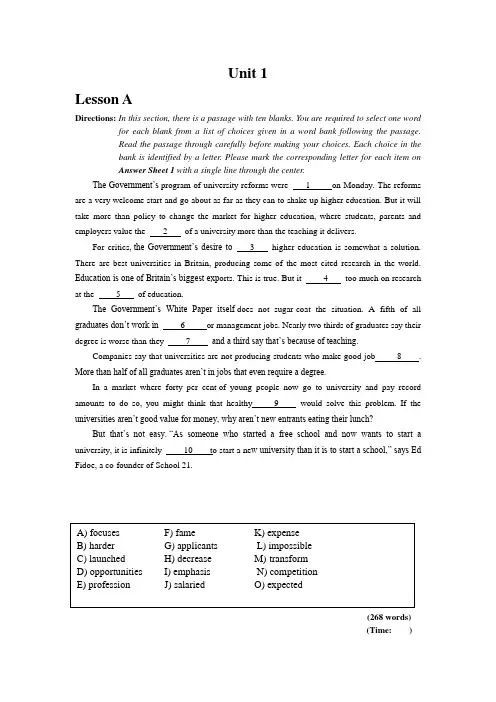
Unit 1Lesson ADirections: In this section, there is a passage with ten blanks. You are required to select one wordfor each blank from a list of choices given in a word bank following the passage.Read the passage through carefully before making your choices. Each choice in thebank is identified by a letter. Please mark the corresponding letter for each item on Answer Sheet 1 with a single line through the center.The Government‘s program of university reforms were 1on Monday. The reforms are a very welcome start and go about as far as they can to shake up higher education. But it will take more than policy to change the market for higher education, where students, parents and employers value the 2 of a university more than the teaching it delivers.For critics, the Government‘s desire to 3 higher education is somewhat a solution. There are best universities in Britain, producing some of the most cited research in the world. Education is one of Britain‘s biggest exp orts. This is true. But it 4 too much on research at the 5 of education.The Government‘s White Paper itself does not sugar-coat the situation. A fifth of all graduates don‘t work in 6 or management jobs. Nearly two thirds of graduates say their degree is worse than they 7 and a third say that‘s because of teaching.Companies say that universities are not producing students who make good job 8 . More than half of all graduates aren‘t in jobs that even require a degree.In a market where forty per cent of young people now go to university and pay record amounts to do so, you might think that healthy 9 would solve this problem. If the universities aren‘t good value for money, why aren‘t new entrants eating their lunch?But that‘s not easy. ―As someone who started a free school and now wants to start a university, it is infinitely 10 to start a ne w university than it is to start a school,‖ says Ed Fidoe, a co-founder of School 21.(268 words)(Time: )来源:/opinion/2016/05/16/university-reforms-are-welcome-but-dreaming-spi res-will-still-tr/Lesson BDirections: In this section, you are going to read a passage with then statements attached to it.Each statement contains information given in one of the paragraphs. Identify theparagraph from which the information is derived. You may choose a paragraphmore than once. Each paragraph marked with a letter. Answer the questions bymarking the corresponding letter on Answer Sheet 2.A) ―Children doing tests should not cause such hysteria(歇斯底里). The reality is that in good schools, children are not stressed. Last week witnessed red-letter days, or so those who oppose the Government‘s plans to improve education would have you believe. ‖ On Tuesday, parents kept their children at home. They did so because the Government forced primary aged children as young as six and seven to take many tests.B) This could have been a major disruption, except the vast, vast majority of parents didn‘t join in. By and large, children came into school for a normal day of lessons. I know this because as someone responsible for the education of around 20,000 primary aged children, fewer than 10 were kept away from school.C) The basic precondition of the ‗Let Kids be Kids‘ boycott was a flawed one. It shouted thattesting is stressing children out - so much so that they feel failures and are having nightmares about the Key Stage 1 and Key Stage 2 tests. The fact is that whether they are Key Stage 1 tests this month, or Key Stage 2 tests this week, the notion of children doing tests should not be causing such hysteria.D) The reality is that in good schools, children often do not even know they are being tested.Actually in good schools, most children are being taught and tested in the basics of reading, writing and arithmetic as well as exploring the more creative side of the curriculum (课程). In good schools they do all of this - and what‘s more they have a good dose of fun too.E) Common sense tells us that to be able to know how well a child is doing, you need to test themat the beginning of their time at school so you know their starting point, test them half way through so we know how well they are progressing and, finally, test them at the end of their time at school so that we know they are suitably prepared for the next step of their education.F) Where children are feeling so distressed, you have to ask what on earth is the school doing tomake them feel that way? The first stop for any parent whose child feels this way is a frank discussion with the head. Let‘s be clear: these are tests, not exams. We are not talking about exam hall conditions, with rows of tiny children sitting in fearful silence. Tests can beincorporated into the school day to such an extent that children don‘t even realize they are being tested.G) In other schools, children simply take the tests in their stride and even enjoy the opportunity toshow what they can do. Of course, the anti-test parents also cry foul play that these tests are being used for more evil means: in other words, to measure how well teachers are teaching.Heaven for fend!H) But what is so terribly wrong with that? No teacher doing a decent job should have anyconcerns in this respect. Those who feel this is a step too far, are the same individuals who complain about the less and less accountability in our schools – well, what better way to hold our schools to account that actually see how well teachers are teaching? Can you get right the SAT question for 11-year-olds an education minister got wrong?I) Another associated accusation is that the tests are simply too hard. They are hard and rightlyso. As a country, we are behind our international counterparts in an awful manner. And the simple fact is that our six and 11-year-olds will be required to compete with other six and 11-year-olds in countries that are leagues ahead of us.J) They need to be prepared for this future, and so it is compelling for us to ensure they put the ground work in now. But that doesn‘t mean to the exclusion of everything else - pupils can, and do, learn the basic things of these disciplines and explore, play and have fun. Those wishing to score political points laugh when a minister is puzzled on a question about nouns, verbs or prepositions. I would have been confused too - and I say that as a head with more than20 years‘ experience and an English Literature graduate on top of that.K) But that, surely, is the whole point: my generation - and indeed most generations until now –simply weren‘t schooled in this. But we should have been. Spending time to secure these foundations need not be at the cost of creativity or enjoyment. The splendid Grande Dame of architecture, the late Zaha Hadid would surely not have been able to create such works of genius without having a detailed and fundamental knowledge of engineering and the basic knowledge of architecture.L) Ultimately, to see children being paraded in front of cameras holding posters and being used to make political points was deeply discomforting. These children also spoke to journalists in words that clearly were not their own (a six year old denouncing ‗Cameron‘ is such case in point). My plea to all of those who showed sympathy to the ‗Let Kids be Kids‘ strike is to do just that: let them be kids - let them learn and let them play, but let them do this in school.M) The week ended with a second red-letter day. More cheers appeared, with the news that the Government was revising its plans to compel all schools to become academies. I‘m not a politician, so bluntly, I‘m not interested in the slight differences of the whys and the wherefores. I‘m interested in what is right for pupils and what is right for parents. And so what I can say, with authority, is that having been a head teacher in academies and in council-run schools, there is just no contest.N) Being an academy is streets ahead when it comes to being able to run a school in the way that is most effective and gets the best results. And what‘s more, academies are also leagues a headwhen it comes to accountability – Academy heads are directly accountable to their local parents: there is no council acting as ―intermediary(调解人)‖.O) In refining its plans, the Government has shown itself to be listening and responding to concerns. But the simple fact is that all schools would benefit greatly from becoming academies and teaching professionals across the country should now seize this opportunity.(1113 words)1.Our children have fallen behind if compared with children at the same age in other countries.2.Actually I found most parents didn‘t join in the protest and their children went to school asusual.3.Despite the supreme importance of basic knowledge, fostering children‘s creativity isessential as well.4.Only by testing can we learn how children are doing in different stages of education.5. A small number of parents were angry because their children were too stressed in school.6.It‘s a good chance for schools because of the Government going to take action in refining itsplans.7.In good schools, children are taught and tested in a more creative way and they enjoy thestudy quite much.8.Some parents don‘t regard tests as a chance to show their children‘s progress even though thechildren like these tests.9.I don‘t think k ids should be politically involved and I expect all kids to go back to school.10.Exams may cause much stress while proper tests can be a part of the school day.来源:/education/2016/05/11/children-doing-tests-should-not-cause-such -hysteria----in-good-s/Lesson CDirections: There are 2 passages in this section. Each passage is followed by some questions or unfinished statements. For each of them there are four choices marked A), B), C), and D). You should decide on the best choice and mark the corresponding letter on Answer Sheet 3 with a single line through the center. (10)Passage OnePizza is a sort of magic trick. It‘s a plate you can eat. So, what went wrong when I made it? Nothing, really. Because, provided you know how to make your own bread, making your own pizza is really, really easy.You can go from zero to pizza in about an hour and a half. Start by boiling a kettle of water, which must be ―hand-hot‖ – this is the trickiest part of all bread. If it is too warm, it will kill the yeast, and the bread won‘t rise. What‘s hand-hot water, I hear you ask? Delia, who was in a helpful mood when she wr ote this chapter, describes it as water ―you can hold your finger in without discomfort‖. You might think that she could have suggested a temperature, so you could test it with a thermometer, instead of periodically dipping your hand in a jug. Sadly, this thought doesn‘t seem to have occurred to Delia.Once you‘ve got your dough, roll it into a circle, and you‘re ready to add your toppings. There is an easy way and a hard way to do this: either chop your own tomatoes and place them carefully to form the bottom layer of the topping. Or just use tomato puree (果泥), which works just as well and is much easier. A good rule of thumb is to treat your pizza base rather like a baking tray – whatever cheeses you put on it will expand. Forgetting this will produce a lovely pizza with cheese all over the sides – and small, hard bits of cheese that will take ages to clean off.Besides, there was only one problem: it‘s a little soul-destroying to learn that pizza is only a little more difficult to make than a boiled egg and significantly easier to make than bread. Pizza, it turns out, is bread‘s terrible friend that dropped out of university, penniless and asking for money. And OK, pizza is sexier and knowing how to make pizza will get you invited to a lot more parties than bread. But I think I was a little happier before I knew that every pizza I‘ve ever ordered would have been quicker, cheaper and easier to make at home.来源:http://www.readersdigest.ca/readers-digest-international/housewife-cuisine(376 words)1. In what case does the author think making pizza is easy?A. If you have enough time and energy.B. If you are good at making bread on your own.C. If you have a plate to put pizza in.D. If you know a little bit magic trick.2. Why hands-hot water is the trickiest part of bread making?A. Because the water should be neither too hot nor too cold.B. Because only warm water can help bread to rise.C. Because unclean water will prevent yeast from rising.D. Because water must be tested with a sophisticated thermometer.3.Why doesn‘t Delia use a thermometer to test water‘s temperature?A. Because she was not in a good mood when writing the tips.B. Because she thinks putting your hand into jug is more convenient.C. Because a thermometer may not work in hot water.D. Because it seems she doesn‘t think of this method at all.4. Which of the following sentences is correct according to Para.3?A. It is quite hard chopping your own tomatoes and putting them under the toppings .B. Using tomato puree is not as tasty as using chopped fresh tomatoes.C. Never treat a pizza as a baking tray because it will expand with cheese.D. All bits of cheese should be cleaned off to make a really cute pizza.5. What is implied in the last paragraph?A. Making pizza is as easy as making a boiled egg if you can make bread.B. Pizza is an ―A-list‖ student who deserves a well-paid job after graduation.C. Pizza can help you gain more popularity in some social communications.D. The author will order more pizza because it‘s too costly to make pizzas at home.Passage TwoTaylor Swift was born on December 13, 1989, in Pennsylvania. She was named after singer James Taylor. Her father is a financial advisor. Her mother is a homemaker who previously worked as a mutual fund marketing executive. Swift‘s mothe r, though American, spent the first 10 years of her life in Singapore before returning to the U.S. and settling in Texas.Swift spent the early years of her life on a Christmas tree farm in Pennsylvania. She attended preschool and kindergarten at the Alvernia Montessori School before moving to the Wyndcroft School. The family then moved to a rented house in the suburban town of Wyomissing, Pennsylvania, where she attended Wyomissing Area Junior/Senior High School. Swift summered at her parents‘ oceanfront vacation home in Stone Harbor, New Jersey, and described it as the place ―where most of my childhood memories were formed‖.At the age of nine, Swift became interested in musical theatre and performed in four Berks Youth Theatre Academy productions. She also traveled regularly to Broadway for vocal and acting lessons. Swift later turned her attention to country music—Shania Twain‘s songs made her ―want to just run around the block four times and daydream about everything‖.She spent her weekends performing at local festivals, coffeehouses, fairs, karaoke contests, garden clubs, Boy Scout meetings and sporting events. At the age of eleven, after many failed attempts, Swift won a local talent competition and was given the opportunity to appear as the opening act for Charlie Daniels at a Strausstown theater.After watching a documentary about Faith Hill, Swift felt sure that she needed to go to Nashville, Tennessee, to pursue a music career. At the age of eleven, she traveled with her mother to Nashville to submit a demo(样本唱片). She received rejections and realized that ―everyone in that town wanted to do what I wanted to do. So, I kept thinking to myself, I need to figure out a way to be diff erent‖.When Swift was about 12 years old, a computer repairman taught Swift how to play three chords on a guitar, inspiring her to write her first song, ―Lucky You‖. She had previously won a national poetry contest with a poem titled ―Monster in My Closet‖, but now began to focus on songwriting.来源:https:///wiki/Taylor_Swift(376words)1.What do we know of Taylor Swift‘s parents?A. Swift‘s mother is a housewife after quitting her job as a mutual fund marketing executive.B. Swift‘s mother has never left America because she needs to take care of a big family.C. Swift‘s mother spent her childhood in Asia bef ore going to Texas.D. Swift‘s father likes James Taylor‘s songs and expects his daughter to become a singer.2. Which of the following statements is NOT true?A. Swift‘s childhood was spent both in Pennsylvania and New Jersey.B. Swift‘s father didn‘t buy a house in the outskirt of Wyomissing.C. Swift thought spending schooldays at the seaside was really unforgettable.D. Swift didn‘t spend her kindergarten in Wyndcroft S chool.3. How did Swift turn her attention to country music?A. She touched country music in musical theatre before the age of ten.B. Her regular travel to Broadway provided more chances of acting.C. She was attracted to some singer‘s music which gave her power and dream.D. She had talent in country music and won a competition.4. What do you know about Swift‘s travel to Nashville with her mother?A. She went there to record her first demo to be submitted to some record company.B. It came as no surprise that Nashville rejected Swift.C. Swift was frustrated by the fact that most people there had the same dream.D. Swift gradually realized it was necessary to stand out with a unique style.5. What can you profit from reading the story of Taylor Swift?A. Being named after some celebrity is essential for a rosy future.B. Successful people must have moved from place to place at early age.C. Talent alone is not the predictor of being highly successful.D. Being well-educated can inspire a musician‘s creativity.AnswersLesson A1. C2. F3. M4. A5. K6. E7. O8. G9. N 10. B Lesson B1. I2.B3. K4.E5.A6. O7.D8.G9.L 10.F Lesson CPassage One1. B2. A3.D4. A5.CPassage Two1. A2. C3. C4. D5.C。
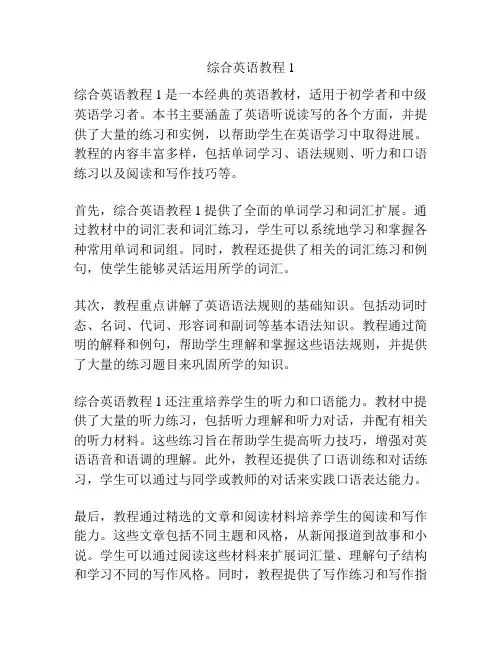
综合英语教程1综合英语教程1是一本经典的英语教材,适用于初学者和中级英语学习者。
本书主要涵盖了英语听说读写的各个方面,并提供了大量的练习和实例,以帮助学生在英语学习中取得进展。
教程的内容丰富多样,包括单词学习、语法规则、听力和口语练习以及阅读和写作技巧等。
首先,综合英语教程1提供了全面的单词学习和词汇扩展。
通过教材中的词汇表和词汇练习,学生可以系统地学习和掌握各种常用单词和词组。
同时,教程还提供了相关的词汇练习和例句,使学生能够灵活运用所学的词汇。
其次,教程重点讲解了英语语法规则的基础知识。
包括动词时态、名词、代词、形容词和副词等基本语法知识。
教程通过简明的解释和例句,帮助学生理解和掌握这些语法规则,并提供了大量的练习题目来巩固所学的知识。
综合英语教程1还注重培养学生的听力和口语能力。
教材中提供了大量的听力练习,包括听力理解和听力对话,并配有相关的听力材料。
这些练习旨在帮助学生提高听力技巧,增强对英语语音和语调的理解。
此外,教程还提供了口语训练和对话练习,学生可以通过与同学或教师的对话来实践口语表达能力。
最后,教程通过精选的文章和阅读材料培养学生的阅读和写作能力。
这些文章包括不同主题和风格,从新闻报道到故事和小说。
学生可以通过阅读这些材料来扩展词汇量、理解句子结构和学习不同的写作风格。
同时,教程提供了写作练习和写作指导,帮助学生提高写作能力,并鼓励他们进行创造性写作。
总的来说,综合英语教程1是一本全面、丰富的英语教材,适合初学者和中级学习者使用。
通过学习这本教材,学生可以全面提高听说读写的能力,扩展词汇量,掌握基本语法知识,并培养阅读和写作能力。
这本教材不仅适用于学生课堂学习,也可以作为自学资料使用。
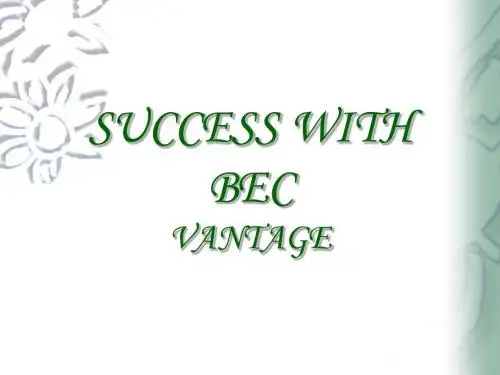
中级英语口语教程摘要:一、前言1.学习英语的重要性2.中级英语口语教程的目标二、教程概述1.教程级别及目标2.教程结构与内容三、教程特点1.实用性2.系统性3.互动性四、教程学习方法1.合理安排学习时间2.积极参与课堂活动3.结合实际场景进行练习五、总结1.中级英语口语教程的价值2.对学习者的期望正文:一、前言在全球化的今天,英语作为国际通用语言,已成为人们交流、学习、工作必不可少的工具。
对于许多已经掌握了基础英语知识的学习者来说,如何进一步提高英语口语能力,成为了一个亟待解决的问题。
为此,我们推出了这本针对中级英语学习者的口语教程,旨在帮助学习者提高英语口语水平,更好地应对日常生活和工作中的英语交流场景。
二、教程概述1.教程级别及目标本教程针对英语水平达到初级的学习者,帮助他们进一步提高英语口语能力,达到中级水平。
教程将从词汇、语法、发音等方面进行全面训练,使学习者能够熟练地运用英语进行日常对话,提高英语口语交流的自信心。
2.教程结构与内容教程共分为若干单元,每个单元围绕一个主题展开,包括词汇、句型、对话、听力、发音等部分。
通过多样化的教学手段,如讲解、练习、角色扮演等,使学习者全面掌握英语口语技能。
三、教程特点1.实用性本教程内容紧密结合实际生活场景,使学习者在轻松愉快的氛围中提高英语口语能力。
教程中所涉及的词汇、句型均为日常交流中常用,帮助学习者在实际生活中自信地运用英语进行沟通。
2.系统性教程按照由易到难的顺序编排,使学习者逐步掌握英语口语技能。
每个单元的内容相互补充,形成一个完整的英语口语学习体系。
3.互动性本教程注重学习者的参与和互动,鼓励学习者在课堂上积极发言,与同学、老师进行英语交流。
教程还提供了丰富的课外活动,如英语角、角色扮演等,使学习者在轻松愉快的氛围中提高英语口语能力。
四、教程学习方法1.合理安排学习时间学习英语需要持之以恒,学习者应合理安排学习时间,每天坚持学习,不断巩固和提高英语口语能力。
中级美语教程1
Lesson 1 Rome Wasn't Built in a Day
English is an international language. Therefore, it is
necessary for us to learn it. It can be rewarding or just a
waste of time. It's up to you. It depends on how you study it.
Here are some tips about learning English.
First, don't be afraid to make mistakes. You will learn from
them. Second, you must not be shy. Be thick-skinned and speak
up! Finally, you must be patient. Remember, "Rome wasn't
built in a day."
Lesson 2 How to Improve Your English
Mack is talking to his friend Don.
M: Hi, Don! How are you doing in your English class?
D: Not so well, I'm afraid.
M: What's the problem?
D: I'm not improving. Tell me, how come your English is so
good?
M: Well, uh…I have an American girlfriend.
D: Aha! That's it. Now I know what to do. (He runs off.)
M: Hey, Come back! I was just kidding!
Lesson 3 The City of Song
Listening to music is the favorite pastime of many people all
over the world. This is especially true for people living in
Vienna, the city of song. Being the home of Mozart, this city
is the birthplace of classical music and the waltz.
Music fills the air in Vienna. Going to public concerts is
often free of charge. And don't forget, Vienna is also home
to the world famous Vienna Boys' Choir. No wonder people say
Austria is always alive with the sound of music.
Lesson 4 He Who Hesitates Is Lost
Mike is in Vienna with his girlfriend Daisy.
M: Are you having a good time, Daisy?
D: Are kidding? I'm having the time of my life. I loved the
concerts.
M: Concert going is fantastic but what else can we do?
D: Biking along the banks of the river Danube could be fun.
M: It sounds like a great idea!
D: Let's do it then.
M: You're right. As they say, "He who hesitates is lost."
Lesson 5 Bungee Jumping
Bungee jumping looks like fun. It makes me nervous just to
watch someone do it. It certainly takes a lot of guts to jump
one thousand feet above the water with only a rope tied to
your legs. It scares me just to think about it. However, it
is something I really want to do one day.
Some people think I'm crazy. They say to jump is foolish
enough, but to have to pay for it is madness. I don't agree.
For me, to live a short and exciting life is far better than
to live a long and boring one. What do you think?
Lesson 6 Nothing Ventured, Nothing Gained
Lisa and Bill are talking about their future.
L: What's your goal in life, Bill?
B: To fly in the sky and feel as free as a bird.
L: That's easy.
B: What do you mean?
L: Go bungee jumping.
B: You mush be kidding. It's too dangerous.
L: Well, nothing ventured, nothing gained.
Lesson 7 Doctor Death
Whether very sick people should be helped to end their own
lives is a question many people cannot answer. However,
Dr.Kevorkian is an exception. That he has done this more than
twenty times is known to everyone. Some say what he is doing
is immoral. They call him Doctor Death. Others say what he is
doing is merciful. They call it mercy killing.
Whether Dr.Kevorkian should be allowed to continue doing this
is a real problem for the government. There seem to be two
sides to the argument. Which side are you on?
Lesson 8 No Hearts or No Brains
Helen and Dick are talking about the previous article.